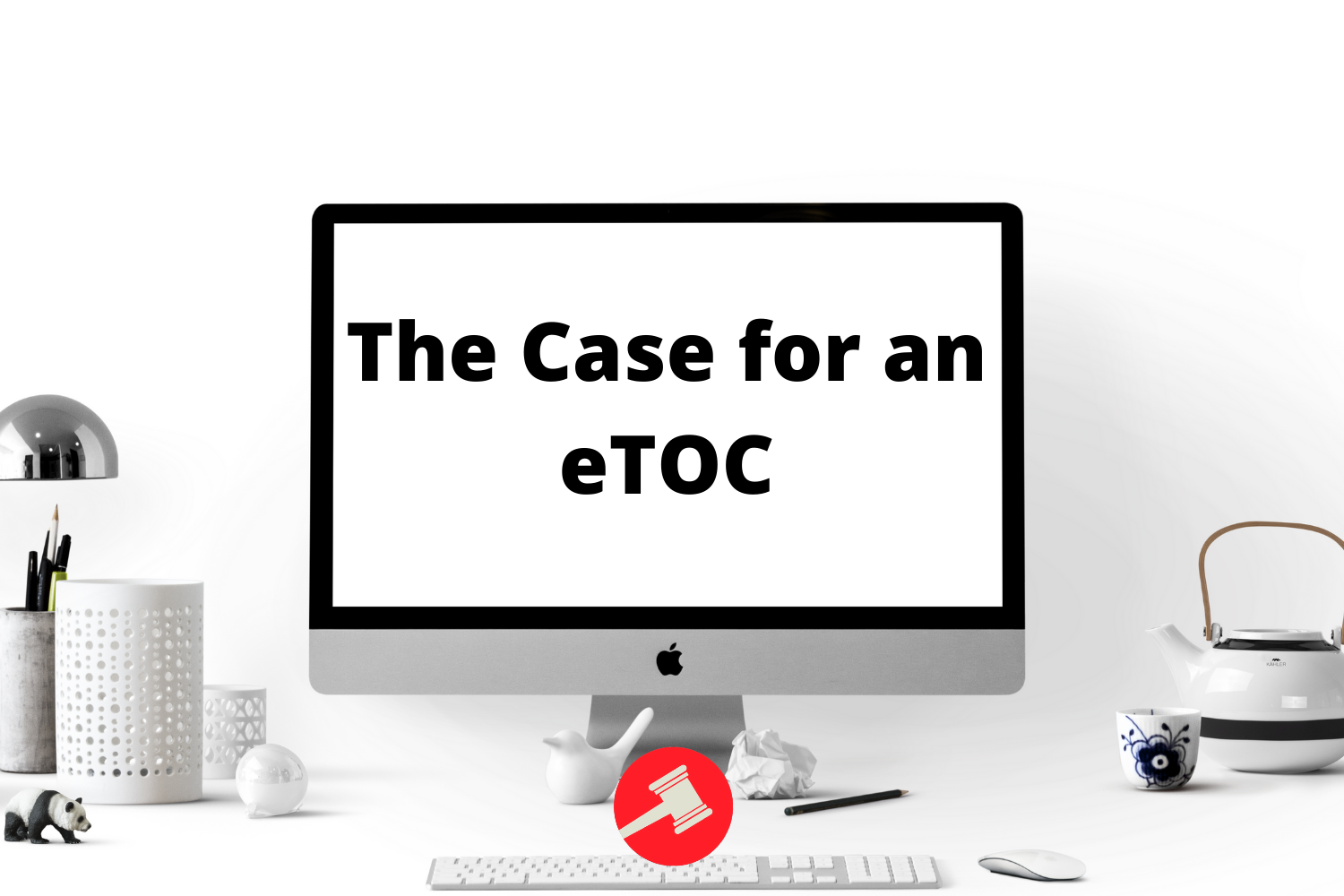The Case for an eTOC

Disclaimer: The views and opinions expressed in this article are those of the author and do not reflect any position of Premier Debate.
Introduction
Beginning on March 11th, and later confirmed on the 12th, the University of Kentucky announced that it would be working with the NSDA and others to move the Tournament of Champions to an online format for the first time in its history. This announcement was immediately met with incredibly harsh feedback from the circuit debate community. Part of the response was pure shock about the announcement and about the apparent lack of consultation with program directors in the decision-making process. Some critiqued the very notion of an online format for the TOC. In this article, I’ll argue that the benefits of an eTOC outweigh the risks, many of which are overstated. To be clear, I don’t believe that an eTOC is guaranteed to be a success. It will require flexibility and hard work by the community, especially the tournament staff, judges, and debaters. But I think a well-executed eTOC will provide a fundamentally positive experience for the students who have earned it, even if it cannot match the in-person version.
Part 1: Answering the Core Concerns
In the wave of anti-eTOC Facebook and blog posts that followed the announcement, several common themes arose. I’ll attempt to lay out each of these concerns, explain why I do or don’t find them persuasive, and weigh them against the alternatives. I should preface this by saying that the bulk of both my experience and the critiques I read were focused on LD, so that should be the assumed context throughout this post.
Concern #1: Technology Issues
Many have pointed to the fact that even at in-person tournaments, debaters often face basic technology issues regarding email, flashing cases, and computer programs used in paperless debate. Thus, some say the technological hurdles involved for a debate conducted over video conferencing would be insurmountable for a group that is seemingly already technologically inept. This apocalyptic vision is one of an eTOC plagued by students and judges facing microphone and video issues, causing delays, discrepancies, and general dissatisfaction with the tournament process. (This is separate but related to the accessibility and cost concerns of technology, which I’ll address later.)
This argument should not be taken seriously. First, the core demographic of most debate tournaments are high school students and college-aged judges. This is not a group unfamiliar with technology. Additionally, this is a group that is likely to spend the next month and a half forced to use this technology for school anyways, which will likely cause students and judges to become experienced with handling these issues anyway. For proof look no further than the host of online debate tournaments that have sprung up over the past few weeks. These represent valuable trial runs for students and judges to gain experience in an eDebate format.
Additionally, an eTOC removes many logistical problems faced by students at traditional tournaments. Normal tournaments are full of small hassles that still delay and setback rounds, such as students getting lost finding the room, using the bathroom during a speech, poor desk set-ups, or debates being shoe-horned into open libraries or gyms. An eTOC would resolve all of these, and it’s easy to imagine eTOC rounds finishing more on schedule than in-person rounds.
This doesn’t mean that TOC tournament staff doesn’t have their work cut out for them. They should put their effort and resources to helping prevent technology issues from arising and resolving them when they do. UK must create rules and procedures for dealing with various types of technological difficulty. What happens if the call drops in the middle of a speech? Or during prep time? If rounds are recorded, can judges with technological issues listen to recordings? Some of these and related questions must be answered in advance but concerns over video conferencing technology as a general matter present little threat to the success of an online debate tournament.
Concern #2: Cheating & Unethical Behavior
The second concern raised by critics of an eTOC is that the online format will lead itself to rampant cheating, presumably through the use of the internet to obtain in-round help from coaches or other sources. This is a legitimate concern, however, it’s unlikely that an online tournament would be severely affected.
The flawed premise is that what currently prevents cheating at in-person tournaments is careful observation and enforcement from the judge. However, as uncomfortable as it is may be to admit, cheating at in-person tournaments is already quite possible, and threat of being caught is simply not what deters students. I’d wager that in 90% of in-person debate rounds a student and coach who conspired to cheat could communicate in-round through digital contact (Slack, email, text etc.) undetected and gain an unethical advantage. The way to stop cheating is through promoting integrity and coaches taking responsibility for their own students – all of which is possible at an online tournament.
Additionally, even if cheating is slightly more prevalent in an online tournament, the magnitude of its impact is overstated. In most rounds, the skill disparity is not so minuscule that cheating would make enough of a difference in the outcome to be worth it for the would-be cheater. The damage to one’s reputation would be total, while the benefit small and speculative. Further, with smart rules (leaving mics and cameras on during prep) and strong discouragement, along with buy-in from coaches to have a no-tolerance cheating rule, an eTOC would fare similarly to a standard tournament.
Concern #3: Financial Accessibility
Another concern raised about an eTOC is the potential accessibility barriers it presents for either small-school or financially disadvantaged debaters. This is a concern that proponents of an eTOC such as myself need to reckon with seriously. However, under any objective metric eTOC is, if anything, more accessible than the brick-and-mortar version.
Previous TOCs have not exactly been budget options for students and schools. A team needs to consider the cost of flights (to fairly expensive regional airports, LEX or CVG (if you’re willing to shell out for a long cab ride)), lodging, food, transportation to and from the tournament each day, judging, and coaching, among other things. Adding these together, a team could easily spend a thousand dollars (per student) on the tournament. The same money could be re-purposed to address the necessary costs of required equipment and internet access for participation in an eTOC. Doing a quick back of the envelope calculation, even an extremely generous equipment set-up could total four hundred dollars. 1 (Snoball Microphone – $70, HD Webcam – $70, Verizon Mobile Hotspot – $200, Verizon Data Plan – $60. I didn’t include a laptop as I think 99% of debaters view it as a required cost of participation in circuit debate to begin with) Additionally, an eTOC increases the accessibility of the tournament to small school debaters, who may normally not have tournament chaperones or other students who may be unable to leave home for several days.
The financial barriers to debate are significant and a rising problem that the community has yet to address sufficiently. But the idea that the eTOC is the largest or most important instance of the issues is simply untrue.
Concern #4: Audio Quality
This concern is related to both the first and third concerns mentioned above, but I wanted to address it specifically. Many have said that due to poor audio quality, debates will be incomprehensible over video conferencing. I agree that many debaters, if they do nothing to change how they spread their cases, would struggle to be understood over video conferencing. However, most debaters struggle to be understood in-person already, which has led to an ever-persistent rise of both coaches and students flowing straight from the speech doc. This has left the reading of the constructive case as little more than a formality. I have more thoughts on this than I can elaborate here, but suffice to say that students can and should adapt to the online format by reducing speed and increasing clarity, a shift that I think few judges would complain about if it persists into the return of in-person competition.
Concern #5: Reputation and Lasting Effects
This concern comes in many varieties. The first is that an eTOC will simply damage the integrity of the national tournament, and that the champion will not have a legitimate claim to the title. This is in part a self-fulfilling argument if combined with other concerns. Obviously an eTOC riddled with cheating, technology issues, and facing low attendance would face legitimacy concerns, but if the tournament doesn’t face those issues and is embraced by the community, the so-called “legitimacy” of the tournament need not be tarnished. Additionally, the long-term impact of this seems unlikely to be devastating. Here are some disruptions and oddities that have occurred in seasons past yet did not permanently undermine or damage the reputation of the associated tournaments:
- A tournament where students could earn bids simply by breaking (i.e. byes in the bid round) because of low attendance
- A tournament where so many debaters from one school filled elims that no debate was held after octas
- A tournament where all (or most) elims were canceled due to weather
- A tournament where the final round was either delayed several months, held well after midnight, or canceled due to the finalists deciding they’d rather not debate.
The LD TOC has even changed formats several times in recent years: it was seven rounds, then eight, then back to seven, and now six. One year a protest formed at the tournament itself, delaying the final prelim round substantially!
The point is that the Tournament of Champions has been around for decades and remains the premier championship tournament of competitive debate high school debate. It will survive, and it will still be considered the most prestigious championship even if there are a few glitches this year.
The second and more serious argument is that a shift to an online format of debate will be hard to undo. And that administrators and schools will see online debate as a justification to further cut costs and gut programs. This is a valid concern that does present a serious negative impact in the long-term. However, I struggle to envision this happening. Institutions have strong status-quo biases, and large breaks from habit by these institutions (especially ones as resisted by the community as the eTOC) seem unlikely to become the norm so quickly. Nonetheless, this is a place where the community can work together to emphasize the eTOC (and other online tournaments during this time) as an exception to the norm that is only necessary due to the extraordinary circumstances, we find ourselves in.
Part 2: The Case for Normalcy
Up until this point my arguments have been re-active, simply answering the concerns. Here I will layout the pro-active reasons why continuing with an eTOC (even a less than ideal one) is the right move. 2 Note that I’m assuming the only realistic options are an eTOC or the wholesale cancellation of the event as in-person events seem off the table for the foreseeable future
First, the bar for canceling the tournament should be high—even if the tournament provides an experience inferior to those of previous years, it is hard to imagine the slight deficiencies being so detrimental to students and their experiences that they ought not debate at all. The TOC is a capstone experience for many students, and while it’s easy for coaches and judges in the community to view the TOC as a yearly event that they’ll be able to return to next year, that simply isn’t the case for students. For many, this is it.
Those of us who are now coaches or judges must appreciate the value students place on TOC and respect the work (and money) many of them have put into preparing for it. Students (especially seniors) have poured hundreds, if not thousands of hours into preparing for the TOC, and if we can provide with an opportunity to reward and recognize that work (even in a less than ideal format) we should. Now, this isn’t to say that your senior-year TOC defines your life (or even your debate career). It doesn’t. (And there is much to be said about the pedestal we put TOC upon in this community.) But still, the TOC is a valuable capstone experience that students have spent honest and admirable effort preparing for. Letting that work go to waste would be a disservice to those students.
Finally, if an online eTOC can facilitate the same exchange of ideas as in-person tournaments (or even comes close) it should continue. Debate at its core isn’t about the “legitimacy” of the trophies you win. Or making sure your opponent understands every syllable perfectly clearly. It’s about the unique combination of argumentation and education that occurs in every single debate round. Anyone who has participated in debate knows the experience is unique, and that many students have too few opportunities to engage in it. Debate is a great activity, and we should have more of it, even in imperfect conditions.
Conclusion
The decisions faced by UK and the TOC Committees are not easy ones, and I do not envy their position. I also recognize that for an eTOC to be successful, it will take significant work by the tournament staff as well as by the community. But the easy option – to just end the season, pack it all up, and cancel – is not the right one.


